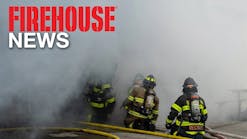The world has changed and so has training in the fire service. In my twenty years with the FDNY I've seen drastic shifts in focus, from coping with heavier protective gear, to the reevaluation of fire tactics in hirise buildings. Much of what we do today is very different than years ago.
The introduction of bunker gear drew more awareness to the strength and endurance level of the individual firefighter everywhere. Suddenly weighed down and encapsulated by forty or fifty pounds of state of the art protection, working in increasingly hotter environments with reduced manpower, today?s firefighters can get a workout at a small fire in a waste paper basket that causes a minor smoke condition, as well as a raging house fire.
From Zero to Sixty
As a working firefighter, the number one risk your faced with every day is the high level of physical exertion that might be necessary at any moment, especially without the benefit of gradually allowing your body to adapt to this new and extreme stress. You go from zero to sixty on a daily basis, and without question.
The alarm goes off and suddenly you're bouncing around in the back of the rig as it screeches down a one-way street the wrong way, against traffic. The fire dispatcher tells your lieutenant about a second phone call with a report of people trapped above the fire.
Before you even get to the scene, your heart is beating through your chest. You put all of that out of your head and dig in and get ready to do WHATEVER is necessary. Regardless of how you feel that day, or even what physical condition you're in, the adrenalin coursing through your veins allows you to do things you might not otherwise be capable of.
Prepare Yourself
But what affect does this have on you? An ill prepared body, with the spirit of well-intentioned and brave firefighter will do what's necessary. Unfortunately, often times we can discover our weakest links when pushed, literally, above and beyond the call of duty.
By far the leading cause of death for firefighters is heart attack. Forty-four percent of all on duty firefighter fatalities in the United States from 1990 to 2000 were attributed to a cardiovascular incident. That's more than double the rate of death caused by asphyxiation or burns (20 percent). That's not to mention the tens of thousand of line of duty injuries firefighters suffer every year in the form of various traumas to the body.
Take a step in the right direction and get started on your own exercise program. Prepare yourself physically for what might be expected of you at any moment. Be sure to eat sensibly, backing up your workout program with a solid nutritional plan as well. I've saved you, as a firefighter, tons of time by putting it all together in one place.
The Firefighter's Workout Book gives you an easy-to-understand diet and exercise guide that shows you how to get firefighter-fit and understand what you're doing, regardless of individual goals, with a minimal amount of equipment and time to train.
Regardless of what methods you choose to prepare for the rigors of firefighting, be sure to educate yourself, and find a safe and effective way to achieve your fitness goals.
Be well and good luck with your training,
Michael Stefano
Related





